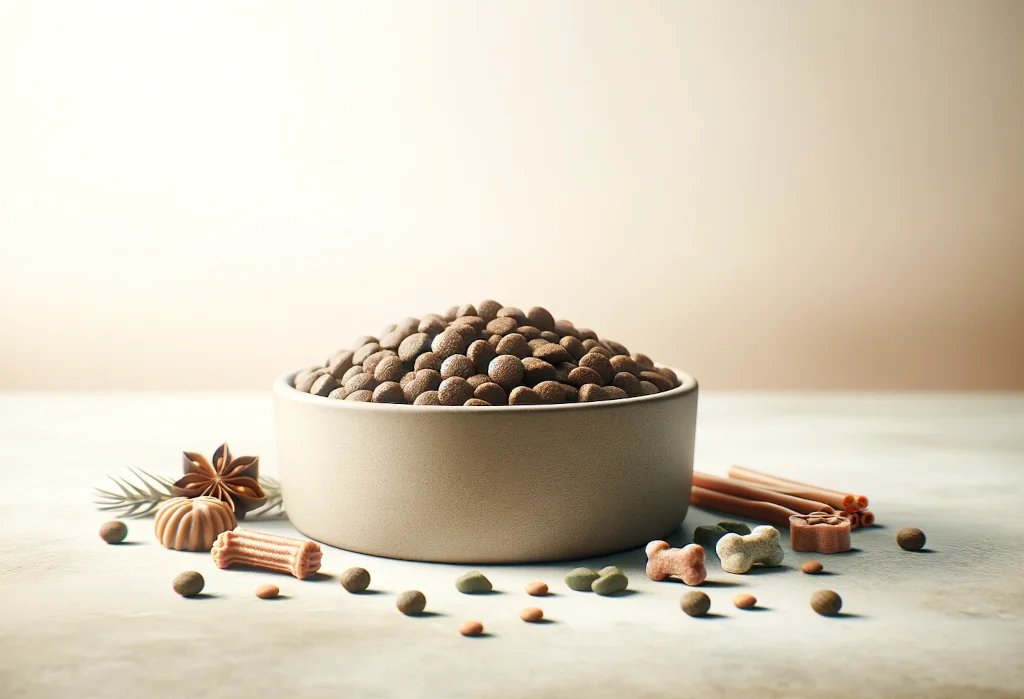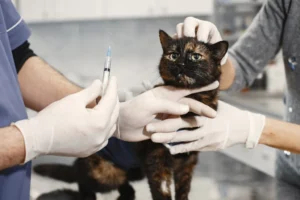Watching your furry friend battle kidney disease can make you feel like you’re on a culinary tightrope. One wrong step in their diet, and you’re amidst a whirlwind of vet visits and worried nights. Yet, ensuring they gobble down the right grub doesn’t have to be a puzzle you’re solving in the dark.
In this blog post, you’ll gain insights into the ideal diet for your dog with kidney disease, ensuring they not only enjoy their meals but also receive the nutrients they need to support their kidney health.
Key takeaways:
- Opt for low sodium, high-quality protein diets, and control phosphorus intake to support kidney function in dogs.
- Avoid high phosphorus foods, excessive protein, and high sodium treats that can exacerbate kidney issues.
- Consult with a vet for tailored homemade meal plans and consider supplements like Omega-3 fatty acids and probiotics to bolster kidney health.
What Does Kidney Disease in Dogs Actually Mean?
When your furry friend is diagnosed with kidney disease, it might feel like a gut punch. In simple terms, kidney disease means your dog’s kidneys aren’t effectively filtering toxins from the blood, leading to a buildup of harmful substances in their body. This can make your pooch feel under the weather, showing symptoms like increased thirst, more frequent urination, lethargy, and reduced appetite.
What’s crucial here is understanding how vital a role diet plays in managing this condition. With the right nutrition, you can help slow the disease’s progression, improve your dog’s quality of life, and maybe even extend those precious years you have together.
What Ingredients Should You Look For?
When scouring pet food labels for your four-legged friend with kidney disease, think of yourself as a detective looking for clues. These aren’t just any clues, but specific ingredients that can aid in supporting their kidney function. Here are the top suspects to look out for:
- Low Sodium: Reducing sodium intake can help manage blood pressure and reduce the work your dog’s kidneys must do. Think less is more here.
- High-Quality Protein: While protein is essential, too much can be hard on the kidneys. Opt for foods with high-quality protein that’s easier for your dog to process.
- Omega-3 Fatty Acids: Found in fish like salmon, these fatty acids can help reduce inflammation and protect kidney function.
- Phosphorus Control: High levels of phosphorus can further damage the kidneys, so foods with lower phosphorus content are preferable.
A great real-world example is prescription diets designed specifically for dogs with kidney disease, like Hill’s Prescription Diet k/d. These foods are formulated with these considerations in mind, aiming to support kidney health.
What Foods Should Your Dog Avoid?
Knowing what to keep out of your pooch’s bowl is just as important as knowing what to put in. Here’s a rundown of the no-go foods for dogs with kidney disease:
- High Phosphorus Foods: Such as dairy products and certain meats, can exacerbate kidney problems.
- High Sodium Treats: Like some commercial dog treats or human snacks, which can increase blood pressure and worsen kidney issues.
- Certain Proteins: While protein is part of a balanced diet, steer clear of high protein snacks or foods that aren’t labeled as “high-quality protein” since these can be more taxing on the kidneys.
It’s not just about avoiding what’s bad but also about embracing what’s good. For instance, lean meats cooked plainly without added salts or seasonings can be a good protein source. Incorporating non-phosphorus-rich vegetables like cauliflower or green beans can also add variety to your dog’s diet without overburdening their kidneys.
Remember, managing your dog’s kidney disease through diet is a delicate balance. Every dog is unique, and its needs can vary greatly. Consulting with a veterinarian or a veterinary nutritionist can provide you with a tailored dietary plan that considers your dog’s specific health requirements, ensuring they receive the best possible care.
How Can Homemade Meals Help?
When your furry friend is diagnosed with kidney disease, the first thing that hits you might be concern—concern about how to ensure their well-being and comfort through their diet. Here’s the scoop: tailoring homemade meals for your pup can play a pivotal role in managing their kidney disease, and it’s not as daunting as it seems.
Tailoring Nutrition: Each dog is unique, and so are their nutritional needs, especially when they’re dealing with kidney disease. Homemade meals allow you to customize the nutrient profile to exactly what your pooch needs, skipping the one-size-fits-all approach of many commercial diets.
Reduced Phosphorus and Protein: Dogs with kidney issues often require diets lower in phosphorus and protein, but the catch is—it has to be high-quality protein. Why? High-quality protein produces less waste, which the kidneys have to filter. Think lean meats like chicken breast or even egg whites—both are excellent sources.
Increased Hydration: A key factor of kidney care is keeping your dog well-hydrated. This is where homemade meals can genuinely shine. By incorporating moisture-rich foods, you can ease the workload on their kidneys. Cue in ingredients like cucumbers or zucchini, which can pep up their meal with minimal effort.
Essential Fatty Acids: Fats are pivotal, especially when you need to pack in more energy without bulking up the protein. Ingredients rich in Omega-3 fatty acids, such as flaxseeds or fish oil, can reduce inflammation and improve kidney function over time.
Consultation is Key: Before you leap into the kitchen, it’s paramount to consult with a veterinarian or a certified pet nutritionist. They can provide guidance on the specific needs of your dog and help tailor a diet plan that fits just right.
Tips for Crafting the Perfect Diet
-
Start with High-Quality Protein: Consider using lean meats or even non-meat proteins that are easier on the kidneys. Your vet can recommend the best options for your dog’s specific condition.
-
Incorporate Kidney-Friendly Veggies: Many vegetables are low in phosphorus and can add both flavor and nutrients without overburdening the kidneys.
-
Keep it Balanced: Ensure the diet includes the right mix of fats, carbohydrates, and fiber. Omega-3 supplements or flaxseed oil can be a great addition.
-
Hydration is Key: Incorporate wet foods or add water/broth to meals to promote hydration.
Are There Any Supplements That Can Support Kidney Health?
Beyond diet, certain supplements can bolster your dog’s kidney health, offering them a layer of support that complements their meal plan. However, it’s not as simple as adding a scoop of this or a dash of that to their bowl. One must tread carefully and always with the vet’s nod of approval. Here are some supplements that have shown promise in supporting canine kidney health:
-
Omega-3 Fatty Acids: Fish oil is a goldmine for Omega-3s, which can help reduce inflammation and lower blood pressure—a boon for kidney function. But, don’t go overboard; moderation is key.
-
B-Vitamins: Kidney disease can lead to some nutrients being lost in urine. B-vitamins are water-soluble, meaning they’re excreted through the kidneys and might need replenishing. They’re important for energy and overall well-being.
-
Probiotics: Emerging evidence suggests that probiotics can support kidney health by helping manage uremia (a buildup of waste products in the blood) and improving gut health, which is often compromised in dogs with kidney disease.
But Here’s the Unique Twist
Astaxanthin: Not commonly mentioned, astaxanthin is a potent antioxidant that can fight oxidative stress and may protect against kidney damage. It’s derived from certain algae and is what gives salmon its pink color. Preliminary studies suggest it could be beneficial for dogs with kidney disease, but it’s a less traveled road that warrants a conversation with your vet.
Remember the Golden Rule
Whether it’s crafting a homemade meal or considering supplements, your mantra should be consultation. Your vet can help determine not just what’s safe, but what’s potentially beneficial for your dog’s specific kidney disease condition.
Creating a health journey for a dog with kidney disease might seem like assembling a complex puzzle. But with the right pieces—customized nutrition, strategic supplements, and expert guidance—you can map out a path that ensures your dog not only survives but thrives.
Alex, a passionate animal lover, has experience in training and understanding animal behavior. As a proud pet parent to two dogs and three cats, he founded AnimalReport.net to share insights from animal experts and expand his knowledge of the animal kingdom.










